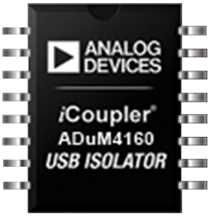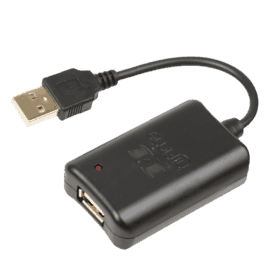Articles, USB Isolators
Solving noise and ground loop issues with USB isolation
UPDATE: Have a look at our new USB Isolation comparison article where we explain which isolator you need.
This article refers to our full speed isolator. We know make a Hi-speed isolator that supports many more devices.
 Ground loops can be a problem when using USB audio devices. It generally happens when they are more than one ground path between two devices. This can result in hum, whining noises or artefacts. The ground shared with the computer is also often quite “dirty” as it is shared with the computers circuitry, processor and possibly also other devices in your house. It can be of great benefit to break the connection to the noisy ground and create a new separate ground.
Ground loops can be a problem when using USB audio devices. It generally happens when they are more than one ground path between two devices. This can result in hum, whining noises or artefacts. The ground shared with the computer is also often quite “dirty” as it is shared with the computers circuitry, processor and possibly also other devices in your house. It can be of great benefit to break the connection to the noisy ground and create a new separate ground.This chip will create a new ground reference on the device side which will break any ground loop and remove the noisy ground.
The adum4160 chip is UL rated for 5000V isolation for 1 minute (UL 1577) and will also protect your devices from electrical shocks and damage from static electricity.
The device side needs to be powered separately. It can be done by supplying external power or power can be taken from the USB rail using a DC DC converter, as we have done with in our usb isolator. The DC is further smoothened with a LC filter.
 Our DAC 2 (UAE23+) includeds the adum4160 chip inside the device to have the DAC always isolated from USB hub ground. This DAC always needs to be supplied external power to function. The benefit of this is that a good quality power supply can be connected and the USB power will not be used at all.
Our DAC 2 (UAE23+) includeds the adum4160 chip inside the device to have the DAC always isolated from USB hub ground. This DAC always needs to be supplied external power to function. The benefit of this is that a good quality power supply can be connected and the USB power will not be used at all.In listening tests the usb isolation have proven to significantly increase the sound quality to connected audio devices.
The usb isolation is “transparent” from the computer. You dont need any drivers or special settings on your computer for it to work. Just plug it in and connect your device.
Limitations
There is a couple of limitation you should be aware of. First, the adum4160 chip support USB “Full Speed” 12Mbps but not “High Speed” 480Mps. This means that DACs accepting up to 96/24 sample rates will work. However if you have a dac that support 192kHz (or higher) sample rates, then it will not work as USB “High speed” is required for anything above 96/24. Note – there is some confusion regarding the use of “USB 2.0” vs “High” and “Full” speeds. USB 2.0 refers to the standard (released in 2000) and supports both Low, Full and High speed. USB 3.0 (released April 2008) additionally supports “SuperSpeed” but still supports low, full and high transfer speeds. So even if your device says it supports USB 3.0 or 2.0 it will work if it runs on Full speed (12Mbps) which is the case for all dacs that support max 96/24.
Second, our usb isolator only provides 200mA of power to power your device. This is sufficient for many devices, but there are DACs and sound cards that will require closer to 500mA which is the max output a normal USB port can deliver. To give you an idea of power consumption we can inform that our Tiny dac requires only 30mA (!).
Adum4160 does accept both Low and Full speed devices, but a setting needs to be changed to select Low speed. Our usb device is factory set to support Full speed devices only, this means that low speed devices like USB mouse, keyboards will not work without modification.
With some computers it will no wake up from sleep by itself, meaning you have to unplug and plug it back in.


Hi there, are there any plans to release a USB C version of this? (USB C input and output)? Right now I have USB A-to-C adapters on both ends but would be great to not have to use adapters! Thanks!
Hi, thanks for the input! There’s is no imminent plan for it, but we might consider it with future production.
I have an analog synth that had a ground loop problem. Putting a transformer-based passive DI between the outputs and my mixer input solved the noise problem fine. I haven’t tried USB isolators yet, but will because they are cheaper than the stereo DI that I used to solve the problem with my new synth. I have other keyboards similarly connected that don’t have the same problem, so it’s not obvious.
The USB isolator is reported to work with some synths and remove the ground loop noise. However it depends on the function of the USB, if it’s midi only then it is likely to work, however might run on USB Low-speed mode and in that case you have to open up the isolator and move both the switches to set it to low-speed mode.
If the USB is used as an audio interface then it depends on the amount of channels and sample rate supported. It will not work if it requires USB High-Speed mode (480Mbps).
I have a MXL009 USB Studio Condenser mic with alot of groundloop hum\noise when connected to a powered laptop\desktop, If I unplug the powercord and work on battery the hum is gone.
Wil this isolator solve the problem ?
And what is the difference between a usb filter and isolator ?
They sell usb power filters on the net for about 6 dollars for filter usb power that not capable of data, will that work on usb condenser microphones ?
Needed to see if someone here can let me know if the ground loop isolator with a alesis io2 usb intreface. Be a big help to know if I should order this to solve my ground loop issue thanks
Which product is best to solve a USB ground loop issue with a Boss GT-100 guitar effects unit?
Is there any other ways to avoid the noisy ground? (in a easy way using passive components)…